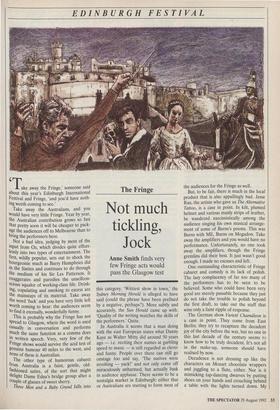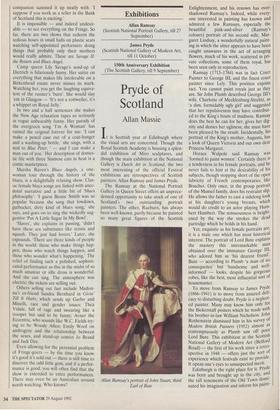EDINBURGH FESTIVAL
The Fringe
Not much tickling, Jock
Anne Smith finds very few Fringe acts would pass the Glasgow test
Take away the Fringe,' someone said about this year's Edinburgh International Festival and Fringe, 'and you'd have noth- ing worth coming to see.'
Take away the Australians, and you would have very little Fringe. Year by year, the Australian contribution grows so fast that pretty soon it will be cheaper to pack- age the audiences off to Melbourne than to bring the performers here. Not a bad idea, judging by most of the input from Oz, which divides quite effort- lessly into two types of entertainment. The first, wildly popular, sets out to shock the bourgeoisie much as Barry Humphries did in the Sixties and continues to do through the medium of his Sir Les Patterson. It exaggerates and parodies the unselfcon- scious squalor of working-class life. Drink- ing, copulating and smoking to excess are the mainstays of its material. Take away the word 'fuck' and you have very little left worth coming to hear: the audiences seem to find it eternally, wonderfully funny. This is probably why the Fringe has not spread to Glasgow, where the word is used casually in conversation and performs much the same function as a comma does in written speech. Very, very few of the Fringe shows would survive the acid test of genuine humour 40 miles to the west, and none of these is Australian.
The other type of humorous cabaret from Australia is a faint, gentle, old- fashioned satire, of the sort that might delight Dame Edna's bridge group after a couple of glasses of sweet sherry.
Three Men and a Baby Grand falls into this category. 'Wittiest show in town,' the Sydney Morning Herald is alleged to have said (could the phrase have been prefixed by a negative, perhaps?). More subtly and accurately, the Sun Herald came up with: `Quality of the writing matches the skills of the performers.' Quite.
In Australia it seems that a man doing with the east European states what Danny Kaye as Walter Mitty did around 50 years ago — i.e. reciting their names at garbling speed to music — is still regarded as clever and funny. People over there can still go onstage too and say, 'The natives were revolting — yuck!' and not only come off miraculously unharmed, but actually bask in audience applause. There seems to be a nostalgia market in Edinburgh: either that or Australians are starting to form most of the audiences for the Fringe as well.
But, to be fair, there is much in the local product that is also appallingly bad. Jesse Rae, the artiste who gave us The Alternative Tattoo, is a case in point. In kilt, plumed helmet and various manly strips of leather, he wandered narcissistically among the audience singing his own musical arrange- ment of some of Burns's poems. This was Burns with ME, Burns on Mogadon. Take away the amplifiers and you would have no performance. Unfortunately, no one took away the amplifiers, though the Fringe gremlins did their best. It just wasn't good enough. I made no excuses and left.
One outstanding characteristic of Fringe cabaret and comedy is its lack of polish. The lazy complacency of far too many of the performers has to be seen to be believed. Some who could have been very good are merely passable because they just do not take the trouble to polish beyond the first draft, to take out the stuff that wins only a faint ripple of response.
The German show Variete" Chameleon is a case in point. They come from East Berlin; they try to recapture the decadent joy of the city before the war, but no one in this last decade of the century seems to know how to be truly decadent. It's not all in the make-up, someone should have realised by now.
Decadence is not dressing up like the characters on Mozart chocolate wrappers and juggling to a flute, either. Nor is it mimicking tap-dancing dwarves by putting shoes on your hands and crouching behind a table with the lights turned down. My companion summed it up neatly with: 'I suppose if you work as a teller in the Bank of Scotland this is exciting.'
It is impossible — and indeed undesir- able — to see everything on the Fringe. So far, there are two shows that redeem the tedious hours in small halls on plastic seats watching self-appointed performers doing things that probably only their mothers would really admire. These are Savage I!: the Return and Blues Angel.
Camp queen Lily Savage's send-up of Dietrich is hilariously funny. Her satire on everything that makes life intolerable on a Birkenhead estate never misses its mark. Watching her, you get the laughing equiva- lent of the runner's 'burn'. She would slay 'em in Glasgow — 'It's not a rottweiler, it's a whippet on Royal Jelly.'
In two and a half sentences she makes the New Age relaxation tapes so seriously in vogue unbearably funny. Her parody of the evergreen song 'I'm A Woman' has ruined the original forever for me: 'I can make a pencil case out of a coat-hanger and a washing-up bottle,' she sings, with a nod to Blue Peter, — and I can make a man out of you.' Her description of domes- tic life with three Siamese cats in heat is a comic masterpiece.
Marsha Raven's Blues Angels, a one- woman tour through the history of the blues, is a delightfully relaxing show. Clas- sic female blues songs are linked with anec- dotal narrative and a little bit of 'blues philosophy': 'I guess Bessie Smith was so popular because she sang that lowdown, gutbucket, dirty kind of blues song,' she says, and goes on to sing the wickedly sug- gestive 'Put A Little Sugar In My Bowl'.
'Slaves', she explains in passing, 'didn't have these sex substitutes like tennis and squash. They just had lovers.' Later, she expounds, 'There are three kinds of people in the world: those who make things hap- pen, those who watch things happen, and those who wonder what's happening.' The relief of finding such a polished, sophisti- cated performance as this in the midst of so much amateur or idle dross is wonderful. And she can sing. The atmosphere was electric; the tickets are selling out.
Others selling out fast include Madon- na's ex-friend Sandra Bernhard in Givin' Till It Hurts, which sends up Garbo and Minelli, race and gender issues; Thea Vidale, full of rage and swearing like a trooper but said to be funny; Avner the Eccentric, who sounds like W.C. Fields try- ing to be Woody Allen; Emily Woof on androgyny and the relationship between the sexes, and stand-up comics Jo Brand and Jack Dee.
Even allowing for the perennial problem of Fringe-goers — by the time you know it's good it's sold out — there is still time to discover the odd little gem, and if a perfor- mance is good, you will often find that the show is extended to extra performances. There may even be an Australian around worth watching. Who knows?



















































 Previous page
Previous page